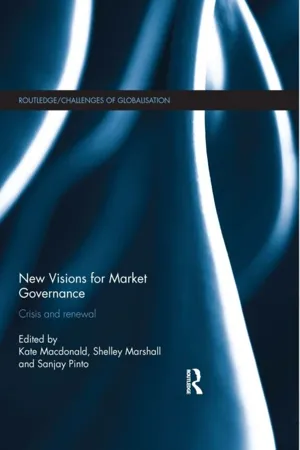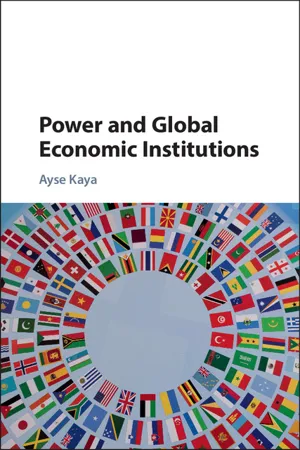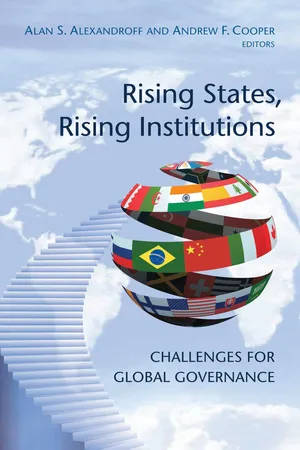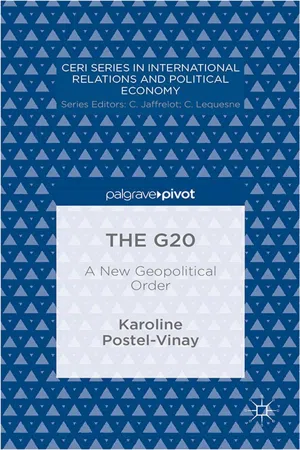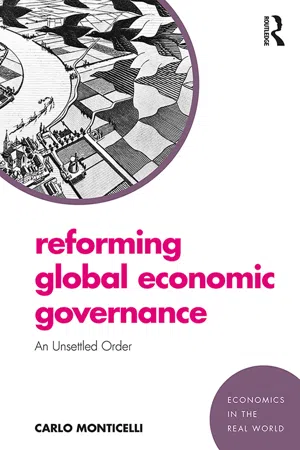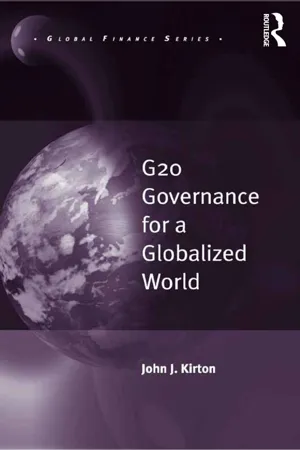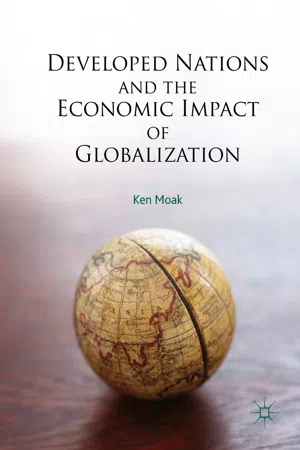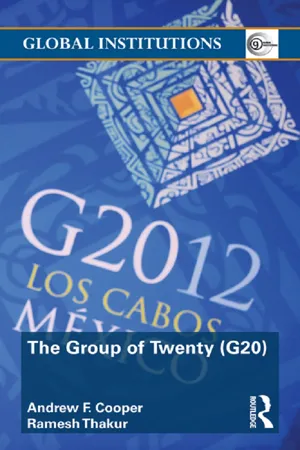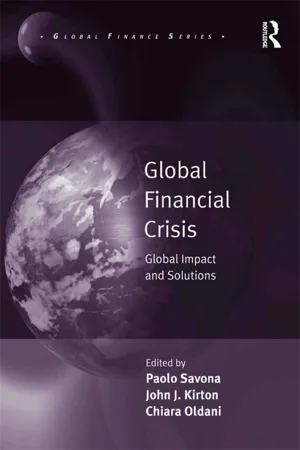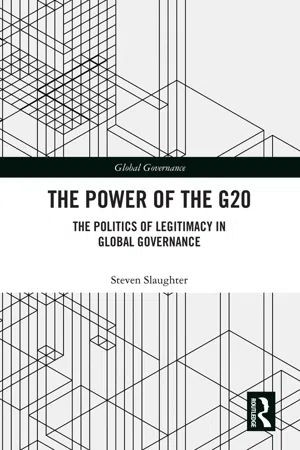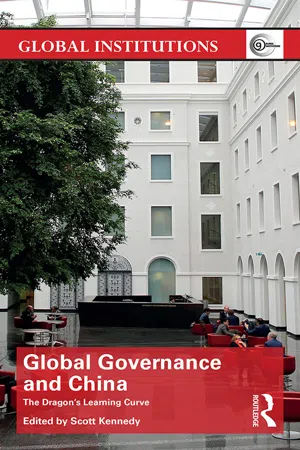Politics & International Relations
G20
The G20, or Group of Twenty, is an international forum for governments and central bank governors from 19 countries and the European Union. It was established in 1999 to discuss policy issues pertaining to the promotion of international financial stability. The G20 members represent major advanced and emerging economies, and their meetings focus on global economic governance and cooperation.
Written by Perlego with AI-assistance
11 Key excerpts on "G20"
- eBook - PDF
New Visions for Market Governance
Crisis and Renewal
- Kate Macdonald, Shelley Marshall, Sanjay Pinto, Kate Macdonald, Shelley Marshall, Sanjay Pinto(Authors)
- 2012(Publication Date)
- Routledge(Publisher)
As global economic interdependence has become a reality therefore, a broader informal grouping of powerful economies has emerged. The G20 was formed in 1999 as an international forum of finance ministers and central bank governors from 19 countries, and also includes the CEOs of the BWIs. Its purpose is to promote international financial and economic stability and to address the chal- lenges posed by increasing globalization. At the September 2009 Pittsburgh Summit, the G20 was “locked in as the pre-eminent international economic body” (Thirwell, 2009), superseding the smaller, more exclusive groupings already mentioned (the G8, OECD), yet also diminishing the influence of groups with wider constituency (i.e., the UN) in this arena. Strengthening global economic governance 99 The G20: identity The G20 includes in its membership emerging economies such as Argentina, Brazil, China, India, South Africa, Saudi Arabia and Turkey, as well as the powerful G8 nations. 1 One excited commentator noted that it “includes everyone who matters” (Financial Times, 2009). The grouping accounts for 85 per cent of global GDP, 80 per cent of international trade and two-thirds of the world’s population. Unlike the OECD its constituent governments are diverse in their makeup: multi-party democracies, transitioning states, a monarchy, and a Com- munist one-party state are all members. They encompass a wide range of incomes and approaches to economics. Certainly when compared to its imme- diate predecessor (the G8), the G20 has a notable diversity and scope that has been widely applauded by politicians and commentators alike (Buckley n.d.; Foster, 2009; Mumford, 2009). The G20: certain strengths The elevation of the G20 to the level of heads of government has afforded greater prominence to developing nation issues. - eBook - PDF
- Ayse Kaya(Author)
- 2015(Publication Date)
- Cambridge University Press(Publisher)
The EU, as a union, is the twentieth member. 2 For a detailed history of the G20 meetings, see Bradford and Lim (2011). 3 This 2008 global economic crisis is now commonly referred to as the Great Recession. For comparisons between the two crises, see, e.g. Frankel and Saravelos (2010) and Eichengreen and O’Rourke (2010). 4 CBS News online, April 2, 2009. 193 the world economic order openly, directly and quite efficiently.” 5 Hu Jintao, the Chinese president, similarly noted that coordination through the G20 has been effective. 6 Since its new beginnings in 2008, the G20 has scheduled its tenth summit for heads of state at the time of the writing of this book. Given that the upgrading of the G20 has also meant the demotion of the G7, the G20’s assent is one of the most important reforms to global economic governance in recent history (e.g., Eichengreen 2009). 7 Since its first summit for heads of state, the G20 has tackled a range of issues regarding global economic governance, including the reform of multilateral economic institutions, particularly the IMF and the World Bank, the regulation of the global financial industries, efforts to engender global economic growth and ensure global food security. The upgrade of the G20 also directly facilitated the expansion of the Financial Stability Forum (FSF) into the Financial Stability Board (FSB). FSB includes the G20 emerging economies, and the G20 has mandated it to act as an umbrella institution for the coordination of financial standards and policies (Helleiner 2012; Lombardi 2011). At the same time, other standard-setting bodies reformed to expand their membership to include the emerging economies of the G20, as the inaugural meeting of the G20 declared standard-setting bodies to “review their membership” (Lombardi 2011, p. 5). The reform of these other sub-global institutions was a by-product of the enhanced status of the G20. The G20 has, thus, become a central institution in the governance of the global economy. - eBook - PDF
Rising States, Rising Institutions
Challenges for Global Governance
- Alan S. Alexandroff, Andrew F. Cooper, Alan S. Alexandroff, Andrew F. Cooper(Authors)
- 2010(Publication Date)
- Brookings Institution Press(Publisher)
196 9 john kirton The G-20 Finance Ministers: Network Governance A t first glance, the Group of Twenty (G-20), founded at the level of finance ministers and central bankers in 1999, is a conventional intergovern-mental institution. Its twenty members, largely the world’s leading countries, are long-established sovereign states. As the twenty are full, equal members, the G-20 affirms in its composition and decisionmaking procedures the sover-eign equality of states to a greater degree than do the United Nations or Bret-ton Woods bodies, with their stratified governance arrangements, or even the G-7/8, which still leaves Russia out of select ministerial forums. And after more than a decade in operation the G-20 finance ministers have no institutionalized civil society participants in their annual gatherings or in their special meetings that started in October 2008. The G-20 has affected the otherwise unconstrained behavior of its members, the international institutions they control, and even some of the world beyond. 2 The international relations literature offers a debate primarily about who leads and benefits from the G-20’s effective governance—the established G-7 powers, 3 the emerging economies, 4 the developing world and its key regions, 5 or the global community as a whole. 6 In exploring the causes of this form of global governance, For the purposes of this chapter, the G-20 refers to the finance ministers and central bank governors of the countries in the group. For a discussion of the G-20 at the leaders level, see the chapter by Alexandroff and Kirton in this volume. I gratefully acknowledge the research assis-tance of Jenilee Guebert, Sandra Larmour, Anton Malkin, Zaria Shaw, and Xu Ting. 2. See Helleiner (2001a); and Sohn (2005). 3. See, for example, Porter (2000); Soederberg (2002); Taylor (2005); Baker (2006); and Mar-tinez-Diaz (2007). 4. See, for example, Bergsten (2004); Boyer and Truman (2005); Yu Yongding (2005a, 2005b); and Beeson and Bell (2009). - eBook - ePub
The G20
A New Geopolitical Order
- K. Postel-Vinay(Author)
- 2016(Publication Date)
- Palgrave Pivot(Publisher)
The L20 concept was debated within the community of international relations experts and analysts. Political scientist John Kirton, founder of the research group on the G8 at the University of Toronto, identified three opinion trends in the debate over the L20. 16 First the L20 “rejectionists” were against expanding the G20’s economic agenda into the political sphere. Second, the “reinforcers” were in favor of strengthening the group into an L20 that would coexist along with established international institutions. Third were advocates of replacing the G8 by the L20, the “replacers.” The second approach, championed by the reinforcers, finally won out, as the G20 became a leadership summit and to date it has replaced none of the existing institutions, not even the G8, despite countless predictions that it was about to disappear or the many expressions of hope that it would. The only difference between what the reinforcers recommended and what actually happened is that the G20 changed its status but not its name. Keeping the same appellation enabled it to maintain an impression of continuity and thereby diminish the risk—albeit inevitable—of reviving the controversy about the group’s composition. The proliferation of Gs and other state groupings since 1945 What place does the G20 occupy today in what Raymond Aron called the “diplomatic constellation,” 17 the multitude of fora in which international negotiations take place? What more precisely is its position within the various “Gs,” those informal groups of states also known as “clubs,” “committees” and “communities”? Why has the G20 prompted such unusual reactions of curiosity, distrust or optimism, and why at this time? The G7 and the G8 have been familiar to the general public for a few decades now. The G20 cropped up in the news more recently, together with the financial crisis catalyzed by the bursting of the American real estate bubble in 2008 - eBook - ePub
Reforming Global Economic Governance
An Unsettled Order
- Carlo Monticelli(Author)
- 2019(Publication Date)
- Routledge(Publisher)
2 For better or for worse, this debate has never gained traction in the international official community. Policy makers have been afraid to initiate contentious negotiations about format and composition, which would have interfered with more pressing matters. One should not underestimate the conservative attitude of incoming and prospective G20 presidencies, which are keen to get the attention guaranteed by hosting the summit and do not want to have a different forum reduce their visibility.Despite the questions raised about its legitimacy and its mixed success, since the upgrade to the leaders’ level, the G20 has unfailingly proven to be the laboratory where the key changes in global economic and financial governance have taken place, have been decided or initiated, formally or informally. Indeed, since 2009, when the major decisions that averted the collapse of the global economy were made in London and Pittsburgh, the G20 has really been the only “G” in town. Even though it has regained some importance in the most recent years, the G7 could no longer rival the G20 for scope of decision or capacity to steer the debate among all the relevant global players. At the same time, the undeniable flaws of the G20 in providing adequate responses to the demand for international policy coordination – a demand arising from ever-increasing interconnectedness – raise legitimate doubts about its longevity as the hub of global governance.The crowning of the G20 as the world-saver
With the success of the Washington meeting, the G20 had proven itself to possess the potential to become the hub for the international coordination of policy responses to the crisis. It could not possibly have become the key forum of international economic cooperation without the important decisions made at the London and Pittsburgh summits in 2009. - eBook - ePub
- John J. Kirton(Author)
- 2016(Publication Date)
- Routledge(Publisher)
PART I Analysing G20 Governance Chapter 1 Introduction DOI: 10.4324/9781315583747-1 The Significance of G20 Governance On December 15–16, 1999, the finance ministers and central bank governors of the world’s 19 most systemically significant countries and the European Union gathered in Berlin for the first meeting of the Group of 20 (G20) (Kirton 2001a, 2001b). They gathered in response to the decisions made earlier that year, endorsed by the Group of Seven (G7) finance ministers and Group of Eight (G8) leaders, to create such a group. These decisions flowed from the initiative of two individuals: the finance minister of the G7’s smallest power, Paul Martin (2008) of Canada, and the treasury secretary of the G7’s largest power, Lawrence Summers (2008) of the United States. Martin, Summers, and their colleagues were reacting to the Asian-turned-global financial crisis that had erupted in Thailand in July 1997, engulfed Indonesia and Korea by the end of 1997, and spread to Russia in August, then the United States, with the collapse of hedge fund Long-Term Capital Management (LTCM) in September and finally to Brazil by the autumn of 1998. These cascading crises demonstrated the inability of the G7/8 and the International Monetary Fund (IMF) acting alone to provide financial stability for a world of increasingly globalized finance. In the view of Martin and Summers, the world needed a new, broader, permanent group of established and emerging countries to serve as a global financial and economic steering committee. They thought that each member of this group would operate as equals in the collective provision of essential global public goods. All the countries they chose as members agreed to join this new group - Ken Moak(Author)
- 2017(Publication Date)
- Palgrave Macmillan(Publisher)
It was desig- nated as the official forum for world economic and financial matters in 2009. The club is made up of 19 of the world’s largest economies plus the European Union (the list of G20 countries can be found through the links provided in the citation). Together, they account for over 85, 80, and 67% of world GDP, trade, and population, respectively. 50 More importantly, the group is represented by all major developed and devel- oping economies, including G7 and BRICS members. The G20 annual leaders’ summits are preceded by formal gatherings of finance ministers/central bankers and other ministries/departments. Since 2008, the G20 finance ministers/central bankers have been meet- ing between two and four times annually to discuss policies on sustain- able global economic growth. The members’ labor and employment ministers meet once a year. G20 should be more able to boost global economic growth because it includes the G7, BRICS, and other econ- omies. Pooling their resources together should give it a huge finan- cial toolkit. And if the developed and developing economies cooperate 7 THE GROUP OF SEVEN AND GROUP OF TWENTY 157 in governing and reforming the world geo-economic order, long-term sustainable economic growth should be attainable. Below is an analysis of the G20 leaders’ inaugural summit. a. The 2008 G20 Washington Summit: The Inaugural Meeting The 2008 summit was the first-time major developing economies participated in a formal gathering as equals (to developed coun- tries) in shaping the global trade and financial systems, discussing the 2008 financial crisis as to why it occurred and how a future crisis can be avoided. 51 In the inaugural meeting, the following actions were taken: 1. Quantitative easing, with central banks printing money to buy sovereign bonds.- eBook - ePub
- Andrew F. Cooper, Ramesh Thakur(Authors)
- 2013(Publication Date)
- Routledge(Publisher)
In surveying the architecture of global governance, the G20 offers the best crossover point between legitimacy (based on inclusiveness and representation), efficiency (which requires a compact executive decision-making body), and effectiveness (where those who make the decisions have the greatest ability to implement or thwart them). The G20 is so composed as to ensure the presence at the top table of the world’s steering committee of all countries the size and/or strategic importance of which—whether economic and/or geopolitical—gives them a particularly crucial role in the discussion of global problems, needs, and solutions. When they apply their combined geopolitical weight to press on particularly intractable problems, it becomes a case of will the immovable object give way to the irresistible force?The core animating purpose of the G20 should be to steer policy consensus and coordination, and mobilize the requisite political will to drive reform and address global challenges while navigating the shifting global currents of power, wealth, and influence. In turn, its impact will be greater if it can combine the personal engagement and informality developed by the G8 summitry, the detailed preparation and follow-up work required to vest summits with successful outcome and delivery, and the unique legitimacy that only the UN can confer as the sole authenticated voice of the collective international community. In other words, the real challenge is how to retain the positive attributes of the existing major nodes of global governance while shedding their pathologies. The answer is to configure and operate the G20 as the hub of a networked global governance.The last word, appropriately, belongs to Paul Martin: “the time for the G20 to draw the line in the sand is now. What the [leaders] should remember is that they are not there to speak only for themselves, but also for the 173 countries that are not at the G20 table.”21 - eBook - ePub
Global Financial Crisis
Global Impact and Solutions
- Paolo Savona, Chiara Oldani, John J. Kirton(Authors)
- 2016(Publication Date)
- Routledge(Publisher)
Yet for all of these positive attributes, some constraints remain before the G20 at the leaders’ level can emerge as the summit of summits. The G20 as a hub of global policy making and governance is premised on the assumption that leaders (as opposed to finance ministers) will maintain their focus on the solutions as well as the problems associated with the financial crisis. As already recognized, most of these remedies are highly technical, whether dealing with a college of supervisors, implementing the accords set out by the Basel Committee on Banking Supervision (BCBS), responding to securities regulation, or crafting central bank legislation. A core challenge will be whether this agenda combines the right ingredients necessary to maintain the commitment of all G20 leaders (already two leaders did not attend the 2010 Toronto Summit, for domestic political reasons, and one did not attend the 2010 Seoul Summit, for health reasons). The London Summit banked in part on the magnetism of its host United Kingdom prime minister Gordon Brown, while the Pittsburgh Summit offered many G20 leaders the first opportunity to visit U.S. president Barack Obama on his home soil. But as the G20 begins to complete its primary tasks, economic order overcomes chaos, and the unifying threat of crisis subsides, there is the risk that a sense of G20 fatigue could emerge.The G20 summit is not free from critique, particularly of its representational claims or its performance quality. As a replica of the G20 finance forum, the G20 leaders’ format and membership have the merit of convenience (see Woods 2009 ). Argentina and Turkey were included in the G20 finance largely because of their position as debtor countries, but this rationale no longer stands up well. Perhaps alternative criteria, including the inter-civilizational dimension, should be added (for example, promoting Turkey but not Argentina). The G20 also privileges Saudi Arabia as a wealthy Arab country, as opposed to others with greater claims of diplomatic representation, most notably Egypt.The issue of European overrepresentation continues to be sensitive. After more than 10 years of euro currency consolidation, the European Union still lacks an international strategy or a common position in multilateral forums, yet it occupies a plurality of G8 seats. French president Nicolas Sarkozy may be lauded for his diplomatic skills in adding Spanish and Dutch appearances at the G20 Washington meeting, along with the presence of the four European G8 members and the European Commission president. However, this persistent imbalance has created a backlash, prominently from the African Union (AU) for equal or fair representation, and has renewed calls from the global South for IMF quota and voice reforms to address disproportionate European weight (Subacchi and Helleiner 2009 - eBook - ePub
The Power of the G20
The Politics of Legitimacy in Global Governance
- Steven Slaughter(Author)
- 2019(Publication Date)
- Routledge(Publisher)
well its policy ideas are transmitted into global governance and the national governance of member states. In this respect, G20 working groups and outreach processes are far from peripheral to the discursive operation of the G20. While the success of the G20’s power is contested and certainly far from automatic, as will be demonstrated in the following chapters, it is clear that G20 working groups and outreach processes have the potential to play an important role in transmitting and amplifying the policy ideas developed by the G20.G20 summitry and discursive global governance
While much attention is paid to the annual meeting of leaders in the G20, the analysis here indicates that the informality of these meetings is supported by a wider policy-making ecosystem of considerable complexity. As such, the G20 has been increasingly referred to as a “hub” for the governments of member states and global governance networks, whereby the G20 is “the hub of other global groups that radiate to bring insights and influence into and out of the hub” and make the broader system of global governance operate in a more consistent and coordinated fashion (Kirton 2013: 35). This sense of the G20 being an apex form of summitry and radiating ideas points to the importance of communication in the purpose and effectiveness of the G20 as a policy-making hub. G20 working groups and outreach groups are key ways that the G20 has attempted to make this form of global governance able to transmit policy ideas more broadly and do so in a way that makes the G20 more transparent by making these forms of public out-reach processes operate as systematic and enduring transnational policy networks. Referring to G20 working groups and outreach processes as transnational policy networks is important, as it emphasises the transnational nature of these disaggre-gated but persistent forms of communication that perform a role in developing and disseminating G20 policy priorities and principles. Transnational policy networks help develop a more accurate picture of the G20 by focusing on the communicative aspects of the G20’s influence and revealing the ways global summits are nested within the practice of various transgovernmental and transnational policy networks. Importantly, these working groups and outreach processes are not unrestricted forums for political debates nor are they horizontal relationships of independent influence. Rather these forums are determined by host states and are focused on including government and social sectors into the practical policy issues applicable to the G20 agenda. - eBook - ePub
Global Governance and China
The Dragon’s Learning Curve
- Scott Kennedy(Author)
- 2017(Publication Date)
- Routledge(Publisher)
Below I first outline China’s broad approach to the G20, which has remained consistent in the years since. The discussion then turns to five core issues that have been raised in the G20 process to measure how China has behaved and what policies it has adopted. The five issues are: reform of the international monetary system in general; reform of international financial institutions, particularly the International Monetary Fund (IMF) and World Bank; international financial regulation; the future of the dollar; and the internationalization of the renminbi. A review of China’s overall posture and its position on these issues is a good indicator to allow us to judge whether China is a status quo power, a modest reformer, or a radical anti-status quo power.The G20’s ascent and China’s participation
The G20 mechanism initially came into being after the 1997–1998 Asian financial crisis, primarily as a gathering of finance ministers and central bank governors to discuss and, if possible, coordinate their international economic policies. As such, by including major developing countries as well as developed ones, the G20 forum created a venue for the future shape of global governance. Since the G20’s inauguration in 1999, China has sent its finance minister and governor of its central bank, the People’s Bank of China (PBOC), and they have actively participated in all of the G20 meetings.18By 2008, when Lehman Brothers collapsed and the crisis was deepening and spreading, the G20 became a readily available vehicle for taking collective action. Initiated by the United States, the first ever G20 summit took place in Washington in November 2008. Chinese President Hu Jintao attended the summit and gave a speech that comprehensively laid out China’s fundamental position and proposals with regards to fighting the massive crisis and reforming the international financial system. The speech is an important document for understanding Chinese policies. It proposes reform of the international financial system aimed at establishing a new international financial order that is fair, just, inclusive and orderly, and fostering an institutional environment conducive to sound global economic development. Hu also put forward four major proposals regarding reform in line with the principles of comprehensiveness, balance, gradualism, and pragmatism.
Index pages curate the most relevant extracts from our library of academic textbooks. They’ve been created using an in-house natural language model (NLM), each adding context and meaning to key research topics.
